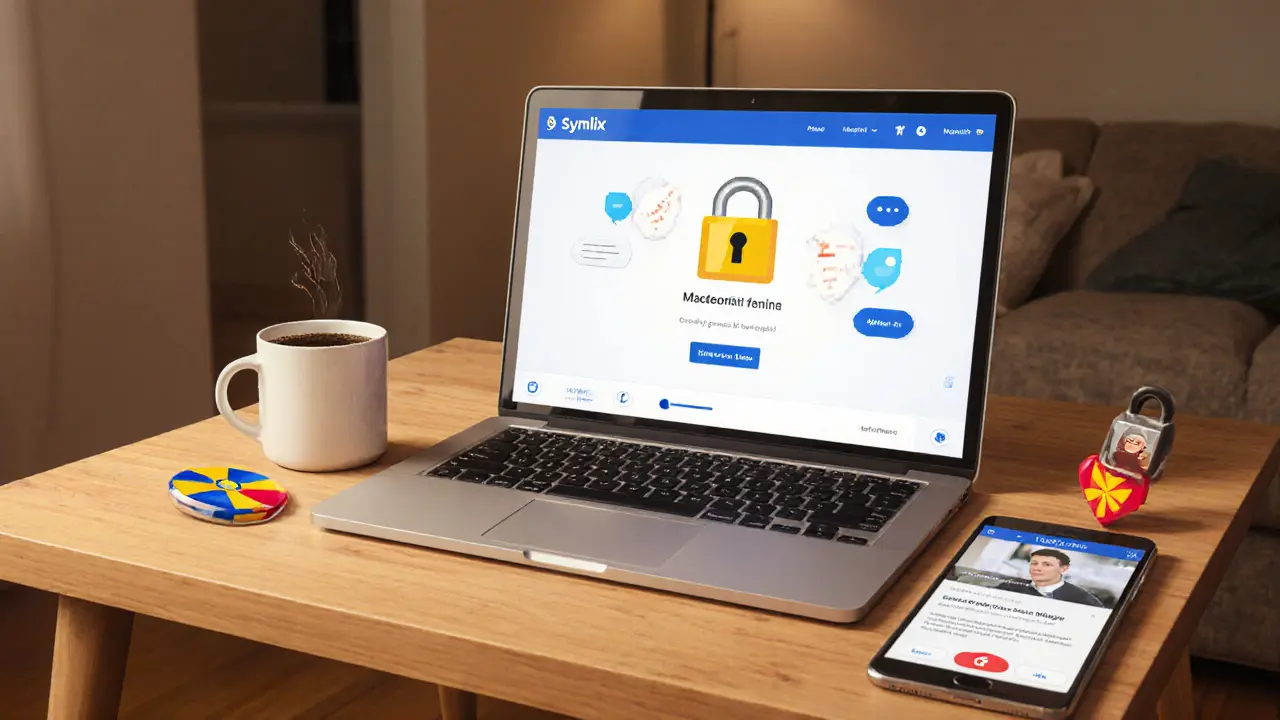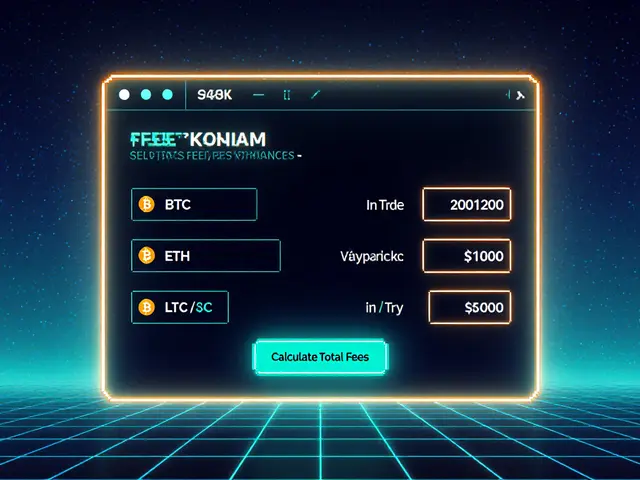P2P Crypto Trade Cost Calculator
Estimate the total fees for a crypto trade in North Macedonia based on your trade amount and platform choice. The calculator accounts for platform fees, escrow fees, and currency conversion costs.
Trying to buy or sell Bitcoin in Skopje feels a bit like stepping into a secret club. The law says crypto trading is prohibited, yet dozens of Macedonians are swapping coins every day on hidden marketplaces. This article untangles the regulatory mess, shows which platforms actually work, and tells you how to stay safe if you decide to dip your toe into this underground scene.
Key Takeaways
- The 2017 prohibition by the National Bank of the Republic of Macedonia (NBRM) officially bans cryptocurrency trading as a foreign securities activity still sits on the books.
- Since February2022 the AML/CTF Draft‑Law has defined virtual assets as property, giving the market a thin legal foothold.
- Peer‑to‑peer (P2P) sites like Symlix provide escrow‑protected cash‑for‑crypto trades tailored to Macedonian users and LocalCoinSwap offers over 300 payment methods, including local bank transfers and cash meet‑ups.
- International brokers such as Swissquote are available to Macedonian residents but charge high fees.
- Regulatory risk remains high - a sudden enforcement of the 2017 ban could freeze assets overnight, so diversification and escrow use are essential.
Regulatory Backdrop - A Legal Gray Zone
In 2017 the National Bank of the Republic of Macedonia issued a blanket prohibition on crypto trading, treating it like foreign securities. The wording was clear: any transaction involving a cryptocurrency counted as a prohibited activity.
Fast forward to February12022, and the Macedonian government amended its anti‑money‑laundering framework. The AML/CTF Draft‑Law introduced legal definitions for ‘virtual assets’, ‘virtual asset service providers’ and ‘cryptocurrencies’, classifying them as property rather than banned securities. This shift didn’t repeal the 2017 ban but created a loophole - if an activity isn’t specifically regulated, it isn’t automatically illegal.
Official statements from the NBRM in 2023 reinforced this nuance: lack of regulation does not equal illegality. Yet the old prohibition still exists on paper, and enforcement remains unpredictable. The result? A market that operates mostly under the radar, using platforms that skirt traditional banking channels.

How Underground Trading Works - The P2P Model
Because Macedonian banks won’t connect directly to overseas crypto exchanges, traders rely on peer‑to‑peer (P2P) marketplaces. These platforms match a buyer and a seller, lock the crypto in an escrow wallet, and release it only after the seller confirms receipt of cash or a local transfer.
Underground crypto trading therefore hinges on three technical pillars:
- End‑to‑end encryption for chat and verification.
- Multi‑signature escrow wallets that require both parties to approve the release.
- A verification layer where users confirm “money transferred” before the crypto moves.
Both Symlix and LocalCoinSwap run these exact steps, offering live chat, video‑call verification, and a 24‑hour dispute resolution team.
Major Platforms - Features, Fees and User Experience
| Platform | Type | Key Features | Typical Fees | Regulatory Status |
|---|---|---|---|---|
| Symlix P2P marketplace with escrow, cash‑meet options | P2P | Live chat, video‑call ID verification, 85% disputes solved < 24h | 1‑2% of trade value + optional escrow fee | Operating in legal gray area |
| LocalCoinSwap P2P platform offering 300+ payment methods | P2P | Instant account creation (≈5min), extensive payment-filtering, mobile app | 0.5‑1.5% per trade | Gray‑zone, no licensing |
| Swissquote Regulated broker, offers crypto CFDs and spot | Broker | Professional UI, Macedonian‑language support, insured custody | High spreads (≈3‑5%); flat €10 fee for small trades | Licensed in Switzerland, serves Macedonian residents |
| Interactive Brokers | Broker | Low fees, limited coin selection, no native crypto wallet | 0.1‑0.2% per trade | Regulated in US, accepts Macedonian accounts |
Notice how the P2P options excel in cash‑access but lack formal consumer protection, while brokers provide regulated environments at the cost of higher fees or limited coin choices.
Legal and Financial Risks You Must Consider
Even though the market is bustling, the underlying legal risk is real. Here are the top three pitfalls:
- Enforcement surprise: The 2017 ban technically still stands. If the NBRM decides to crack down, assets held in local escrow could be frozen, and participants might face penalties.
- Money‑laundering scrutiny: The 2022 AML/CTF amendments mean that large or suspicious trades can trigger investigations. Keeping detailed records is essential.
- Tax ambiguity: With no clear guidance, many traders simply ignore tax reporting, but under Macedonian law any capital gain could be taxable as property income.
To mitigate these risks, seasoned users follow a simple checklist:
- Always trade below the threshold that would attract regulatory attention (e.g., keep individual trades under €2,000).
- Use escrow and verify the counter‑party via video call or a trusted community list.
- Keep a spreadsheet of dates, amounts, counterparties, and exchange rates for potential tax filing.
- Diversify across at least two platforms - if one gets shut down, you still have access to the other.

Step‑by‑Step Guide: How to Start Trading Safely
Below is a practical roadmap for anyone new to the Macedonian crypto scene.
- Choose a platform. For cash‑in, start with Symlix because its escrow is proven and its live chat helps resolve issues fast.
- Create an account. Fill in basic details, verify your email, and complete the required KYC (usually just a photo ID). The whole process takes about five minutes.
- Set up a crypto wallet. Most P2P sites generate a temporary wallet for each trade. For longer‑term storage, download a hardware wallet like Ledger NanoS and write down the seed phrase offline.
- Find a trade. Use the platform’s filter to select “Macedonia”, your preferred payment method (cash‑pickup, bank transfer, or mobile payment), and the coin you want.
- Initiate escrow. The seller’s crypto is locked automatically. Send the agreed fiat amount via the chosen method.
- Confirm receipt. Once the seller confirms they have the cash, the escrow releases the crypto to your wallet.
- Record the trade. Log date, amount, counterparties, and exchange rate in a spreadsheet. This data will be useful if tax rules change.
- Withdraw or reinvest. You can keep the crypto in your hardware wallet, sell it later on the same platform, or move it to a regulated broker like Swissquote for more secure custody.
Most users report that the first trade feels risky, but after a small test transaction (≈€50) confidence rises dramatically.
Future Outlook - From Underground to Regulated?
All signs point to a gradual shift toward formal regulation. The EU’s MiCA framework, which will be adopted by candidate countries, is slated for full implementation in the Balkans by 2026‑2027. Macedonian lawmakers have already hinted at a licensing regime for virtual‑asset service providers in a draft bill expected late 2025.
What does this mean for you?
- Short term (2025‑2026): Expect more “licensed” P2P operators to appear, possibly with lower fees and clearer KYC rules.
- Mid term (2026‑2027): Full MiCA compliance could bring consumer‑protection insurance, mandatory AML reporting, and the possibility of bank‑linked crypto accounts.
- Long term (beyond 2027): The underground market may shrink as banks open crypto‑friendly channels, but niche cash‑traders will likely remain for privacy‑seeking users.
For now, staying informed and using escrow‑based P2P platforms is the most realistic way to trade crypto in North Macedonia without breaking the law outright.
Frequently Asked Questions
Is cryptocurrency really illegal in North Macedonia?
The 2017 prohibition still exists on paper, but the 2022 AML/CTF amendments gave crypto a de‑facto legal status when it’s not regulated. In practice, crypto trading happens openly on P2P platforms, though a sudden enforcement could change that.
Can I use my local bank to buy Bitcoin?
Direct bank connections to international exchanges are blocked. Your best bet is to use a P2P platform that lets you deposit cash or make a local bank transfer to another user’s account, then receive crypto via escrow.
Which platform is safest for small trades?
For amounts under €500, many traders prefer Symlix because its escrow resolves disputes quickly and it offers cash‑pickup options that avoid bank delays.
Do I need to pay taxes on crypto gains?
Macedonian law treats crypto as property, so capital gains are taxable. The tax code is vague, but reporting gains over €1,000 is considered prudent to avoid future penalties.
Will the EU MiCA rules affect me?
Yes. MiCA will require licensing for any crypto service provider operating in Macedonia once it’s fully adopted, meaning future platforms will have clear compliance standards and likely lower risk for users.
Bottom line: North Macedonia’s crypto market sits in a legal twilight zone. By leveraging trusted P2P platforms, keeping meticulous records, and watching regulatory updates, you can trade while minimizing exposure.








Anjali Govind
October 12, 2025 AT 08:20Just wanted to say that the regulatory gray zone in North Macedonia makes it super important to double‑check any platform’s licensing status before you even think about moving money.
Sanjay Lago
October 12, 2025 AT 08:28Yo, I totally agree but also wanna add that many of these P2P sites dont even have proper KYC – that can land you in hot water quicky.
Annie McCullough
October 12, 2025 AT 08:53Symlix offers shallow orderbooks which means higher spread risk especially for large EUR amounts you’ll see price impact grow exponentially 🤨
Carol Fisher
October 12, 2025 AT 09:10It’s disgusting that people think they can dodge Macedonian law – national sovereignty matters and exploiting loopholes is just plain unethical 🙅♀️🚫
Melanie Birt
October 12, 2025 AT 09:43If you decide to dip your toe into the underground crypto scene in North Macedonia, the first rule is to never trust a platform that doesn’t publish a clear fee breakdown.
Escrow services are your best friend because they hold the crypto until you’ve verified that the fiat has actually landed in your bank account.
Most P2P sites charge a flat escrow fee plus a variable platform commission, so you should run the numbers on the calculator before committing.
Remember that the government still has the 2017 prohibition on crypto trading on the books, which means that any transaction could be flagged in a future audit.
Keeping a meticulous spreadsheet of every trade, including timestamps, counterparties, and screenshots of escrow releases, will save you a lot of headaches if tax authorities start asking questions.
Banking under a personal name is riskier than using a corporate entity, because the latter can sometimes claim a different regulatory treatment.
If you’re using Symlix, expect a 1.5 % platform fee and a half‑euro escrow charge, which adds up quickly on high‑volume trades.
LocalCoinSwap is a bit cheaper on commissions but it doesn’t always provide an escrow service, so you’ll need to arrange that yourself.
Swissquote, while fully regulated, will charge you upwards of four percent plus hefty conversion fees, making it unsuitable for anyone looking to save on costs.
Interactive Brokers is the cheapest on pure commission but it doesn’t support crypto directly, so you’ll be forced into a synthetic exposure that carries its own set of risks.
Diversify your counterparties; putting all your euros with a single seller can lead to liquidity freezes if that person decides to walk away.
Stay aware of the political climate – any sudden crackdown could result in frozen accounts or even criminal charges for participants.
Using a VPN and accessing platforms from a neutral jurisdiction can add a layer of anonymity, but it does not make you immune to local law enforcement.
Finally, always test the waters with a small amount first; this will let you gauge the reliability of the escrow process and the honesty of the counterparty without risking a large sum.
In short, treat every transaction as if it were under a microscope, and let the cost calculator be your first line of defense against hidden fees and legal trouble.
Lady Celeste
October 12, 2025 AT 10:00These shady platforms are a breeding ground for scams; avoid them at all costs.
Scott Hall
October 12, 2025 AT 10:16Just a heads‑up, if you’re new to P2P, start with a low‑value trade and use the platform’s built‑in chat to verify the seller’s responsiveness before you lock any funds.
Jade Hibbert
October 12, 2025 AT 10:33Yeah right, because everyone loves losing their savings over a cheap “test trade”, doesn’t it?
Hanna Regehr
October 12, 2025 AT 10:50When you’re weighing platform fees, also factor in the hidden cost of slower settlement times – a delayed escrow release can tie up your capital for days.
Platforms like LocalCoinSwap often have quicker releases because they support multiple payment methods, which can be a lifesaver if you need cash fast.
On the flip side, more regulated brokers such as Swissquote may hold funds longer to comply with AML checks.
Balancing speed, cost, and regulatory exposure is the key to staying afloat in this gray market.
Keep your eyes on the fine print and don’t assume a low headline fee means a safe transaction.
Lena Vega
October 12, 2025 AT 11:06Never skip the escrow step.
Laura Myers
October 12, 2025 AT 11:23People act like they’re pioneers, but in reality they’re just gambling with someone else’s money and then whining when the market dips.
hrishchika Kumar
October 12, 2025 AT 11:40Imagine navigating a labyrinth of hidden fees and legal riddles, where every turn could unveil a fresh surprise – that’s the reality of underground crypto in Macedonia.
Jon Asher
October 12, 2025 AT 11:56I get that, it’s like walking through a maze with no map.
Leynda Jeane Erwin
October 12, 2025 AT 12:13While it is incumbent upon the discerning participant to meticulously scrutinize the contractual obligations of any peer‑to‑peer exchange, honestly the paperwork can be a total snooze‑fest.
Siddharth Murugesan
October 12, 2025 AT 12:30Most of these sites are just a front for money‑laundering schemes, and the people who fall for them are clueless.
Ben Parker
October 12, 2025 AT 12:46That’s a harsh take, but honestly the risk is real 😬💡
Daron Stenvold
October 12, 2025 AT 13:03In my experience, the moment a regulator bites, the entire ecosystem collapses like a house of cards, leaving participants scrambling for any semblance of legitimacy.
Brandon Salemi
October 12, 2025 AT 13:20So true, the stakes are sky‑high.
Manas Patil
October 12, 2025 AT 13:36Leveraging decentralized liquidity pools can mitigate some of the centralized exchange exposure, but one must still navigate AML compliance frameworks prudently.
Ethan Chambers
October 12, 2025 AT 13:53Ah, the usual chorus of doom‑sayers – I’d argue the real opportunity lies in the regulatory vacuum, not the fear it incites.
gayle Smith
October 12, 2025 AT 14:10Let’s cut through the noise: the only thing more volatile than crypto prices is the legal shenanigans surrounding them.